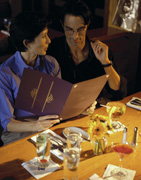- The Best Time of Day to Drink Bone Broth to Maximize Health Benefits
- 8 Ways to Increase Dopamine Naturally
- 7 Best Breads for Maintaining Stable Blood Sugar
- Gelatin vs. Collagen: Which is Best for Skin, Nails, and Joints?
- The Long-Term Effects of Daily Turmeric Supplements on Liver Health
- Could Your Grocery Store Meat Be Causing Recurring UTIs?
- Are You Making This Expensive Thermostat Error This Winter?
- Recognizing the Signs of Hypothyroidism
- 10 Strategies to Overcome Insomnia
- Could Artificial Sweeteners Be Aging the Brain Faster?
Does Higher-Priced Food Taste Better?


While paying more for a meal is worse for your wallet, it might actually make the food taste better, according to a new study.
The study included 139 people in upstate New York who were offered an all-you-can-eat Italian buffet priced at either $4 or $8. After they ate, they were asked to rate the food and their experience.
The diners who paid $8 enjoyed their food an average of 11 percent more than those who paid $4. While both groups ate the same overall amount of food, those who paid $4 were more likely to say they had overeaten, felt more guilt about the meal, and liked the food less and less as the meal progressed, the study found.
The study was scheduled for presentation this week at the American Society for Nutrition’s annual meeting at Experimental Biology in San Diego.
“We were fascinated to find that pricing has little impact on how much one eats, but a huge impact on how you interpret the experience,” Brian Wansink, a professor at the School of Applied Economics and Management at Cornell University, who oversaw the research, said in a meeting news release. “Simply cutting the price of food at a restaurant dramatically affects how customers evaluate and appreciate the food.”
Study author Ozge Sigirci, a researcher at Cornell University Food and Brand Lab, said in the news release: “We were surprised by the striking pattern we saw. If the food is there, you are going to eat it, but the pricing very much affects how you are going to feel about your meal and how you will evaluate the restaurant.”
The authors said their study shows how seemingly minor factors can influence people’s eating habits.
“This is an example of how a really small change can transform how a person interacts with food in a way that doesn’t entail dieting,” Wansink said.
Research should be viewed as preliminary until published in a peer-reviewed journal.
More information
The U.S. Centers for Disease Control and Prevention offers nutrition advice.
Source: HealthDay
Copyright © 2026 HealthDay. All rights reserved.










